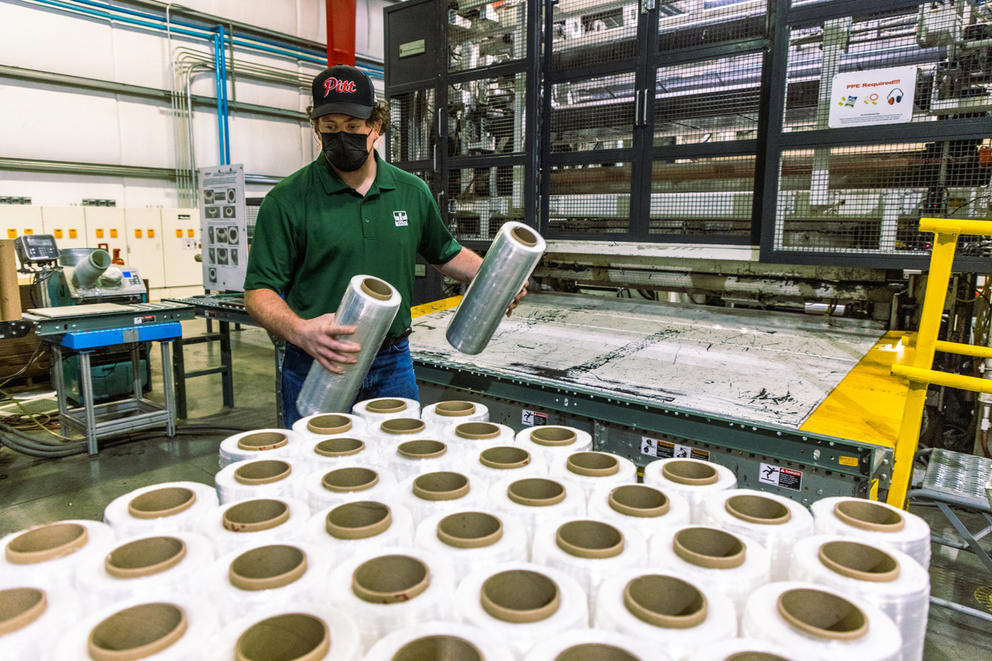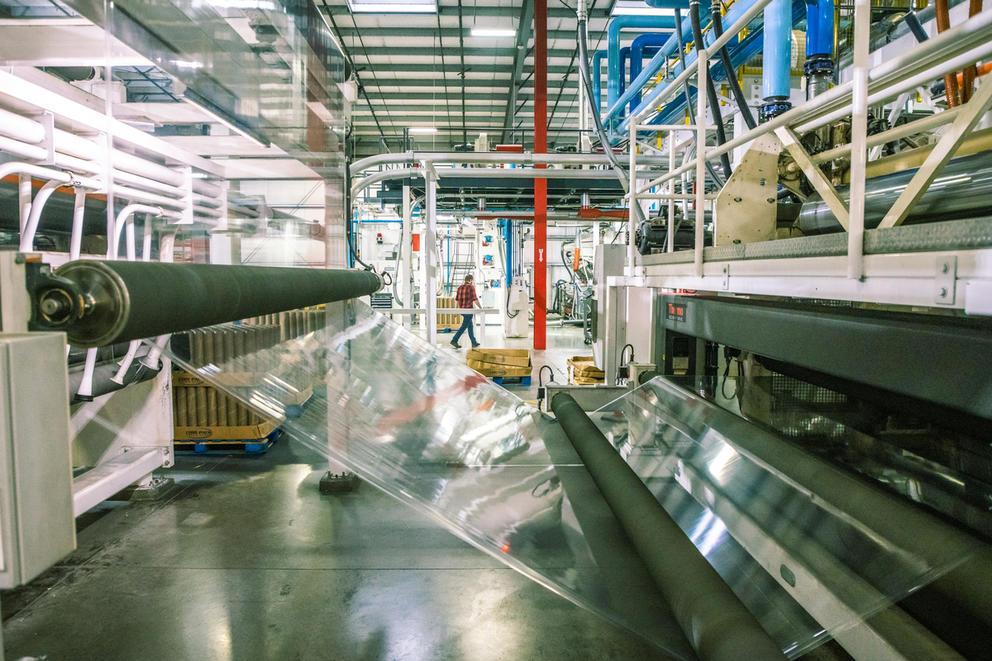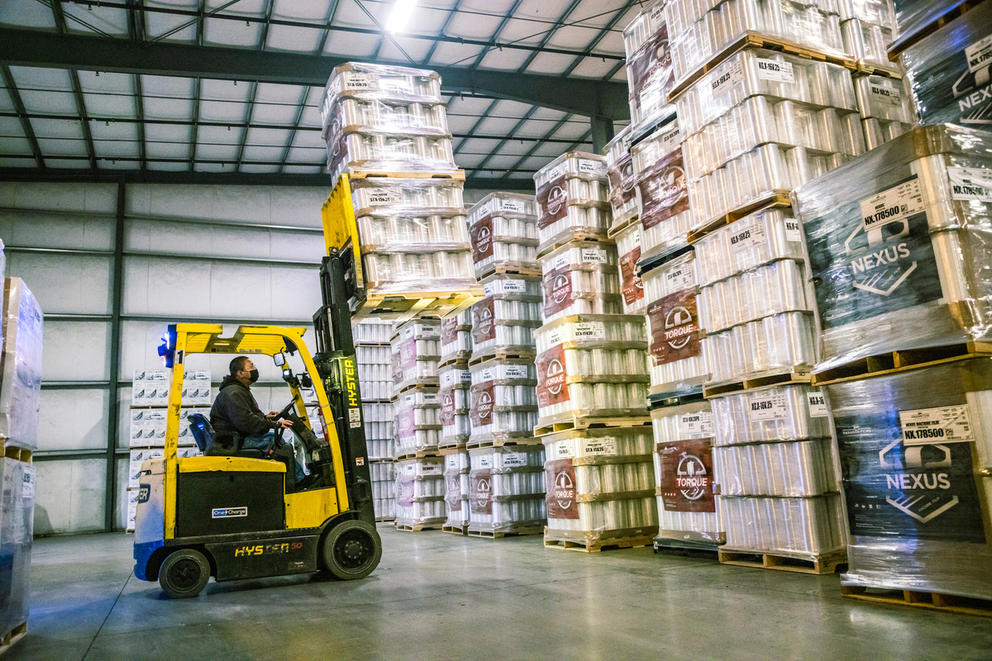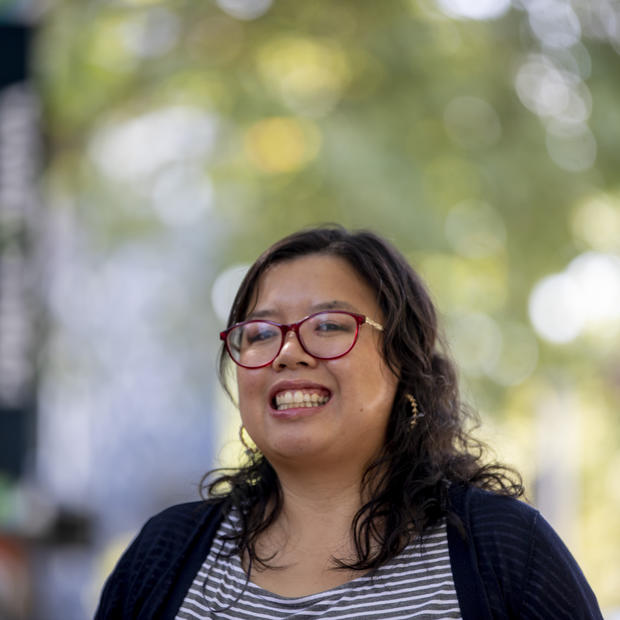The switch came as Franz Bakery worked to offer a more environmentally sustainable product, in part by reducing its plastic use by 10% by 2023, recycling all metal, wood pallets, waste oils, plastic and cardboard used in their bakery locations throughout the Pacific Northwest and converting food waste into feed for local farms.
“This was fitting right into our efforts at the time,” said Ken Waltos, Franz’s vice president of purchasing.
Kwik Lok’s Eco-Lok is made with less fuel, reducing greenhouse gas emissions, the company states.
“It starts to add up when you’re selling millions of units of product,” said Karen Reed, Kwik Lok’s global director of marketing and communications.
Kwik Lok is one of several plastic packaging manufacturers in the Yakima Valley seeking to find alternatives to traditional plastic products, in response to both consumer pressure and new government regulations.
Yakima’s plastics industry collectively provides hundreds of jobs for residents in the Central Washington region. Everything from bread bag closures to frozen food bags comes out of these facilities. To remain economically sustainable, these companies are working toward environmental sustainability as well.
The environmental impact of substantial plastic use is well-known: Most plastics are not biodegradable, leaving plastic in landfills and landscapes and causing harm to wildlife. Plastics are primarily made from fossil fuels, increasing greenhouse gases and contributing to global climate change.
As a result, many — governments and the general public alike — are looking to plastic packaging manufacturers to find less damaging alternatives. And by creating products that are environmentally sustainable, manufacturers also help their business customers improve their products and respond to both government and consumer pressure.
Coalitions like the U.S. Plastics Pact have established benchmarks aimed at significantly reducing plastics entering the environment and increasing the reuse and recycling of materials already in circulation. The U.S. Plastics Pact is working to make sweeping changes within just a few years.
“The quick turnaround signifies urgency. It creates pressure to act — a needed pressure,” said Tiana Lightfoot Svendsen, project and communications manager for the pact. “We don’t have time to waste. We want to make big strides to keep plastic in the economy and out of the environment.”
A shift away from plastic
For Kwik Lok, the Yakima manufacturer, a more significant push for sustainability came as a new generation — the third — of family ownership took over in recent years, Reed said.
CEO Don Carrell looked into alternative materials for customers – bakery companies and food retailers — in nearly 100 countries.
“Our customers in those countries have their own goals and values around environment and sustainability,” Reed said. “It’s good business for us to diversify, and it’s the right thing to do.”
Kwik Lok launched the Eco-Lok in the U.S. in 2019 and released the product in Japan this fall. The company has also launched a closure called Fibre-Lok, a closure made with cotton and wood. The product was aimed at customers in Europe because it meets regulations such as home compostable standards in France.
The company sees the products as a start, but improvement is still needed. The Fibre-Lok does not do well in places with a wet climate. And the Eco-Lok doesn’t work in certain countries that want to avoid using biomass material.
The company wants to reduce its carbon footprint by 20% by 2025 and to have 50% of global sales be of sustainable products by 2025.
“We don’t have the perfect product,” Reed said. “We have a number of good products. We continue to work on our materials sciences with universities and other partners around the world.”
A sheet of Titus handfilm makes its way through the production facility at Paragon Films on Thursday, Nov. 11, 2021 in Union Gap, Wash. Titus is one of Paragon Films’ proprietary stretch film, and is thinner than most other stretch films in its class. This cuts down on material and waste. (Jake Parrish for Crosscut)
For Paragon Films, a manufacturer of wraps used to secure pallets of product for shipping, the way in was creating a durable and thinner film that would require less plastic material overall, reducing the amount of plastic that would enter the environment.
The Broken Arrow, Okla., company opened a plant in Union Gap, just outside of Yakima, in 2013. It created Titus, which the company claims is the thinnest film on the market. It is about four times thinner than the products prominent on the market, said Tim Moar, the company’s senior vice president of marketing and customer operations.
Moar declined to provide specific sales figures but said the response so far has prompted the company to work on increasing capacity to produce the film at its three plants.
“The limitations have been on our own capacity and our underestimation of what the film can do,” Moar said. “The demand for the product surpassed our expectations.”
Like Kwik Lok, the product is a starting point. The next step is to offer films with post-consumer recycled, or PCR, content, which is made from items such as plastic bottles.
The challenge, however, is maintaining the thinness of the film, he said. It seems adding PCR requires an increase in the film thickness, which would increase the plastic material needed.
“You’re actually adding more to a plastics issue,” Moar said.
Moar hopes to solve the issue soon as a few states, including Washington, pass laws requiring minimum PCR content in different plastics products, such as trash bags and milk jugs.
Moar thinks it won’t be long before the products made by Paragon Films will be subject to those regulations, adding urgency to develop a product with PCR content.
“We’re going to start seeing regulations around transit packaging,” he said. “(It’s) going to be important for us to be ahead of the game.”
Novolex, which produces more than 100 different types of packaging out of its Novolex Shields plant in Yakima, developed drop-off sites for plastic bags and films at various retailers across the country. The company reuses plastic resin from those products in manufacturing new products at the company’s plants nationwide.
While regulations drive action, so does demand from consumers, said Phil Rozenski, Novolex’s vice president of public affairs.
“Consumers have seen the levels of packaging waste rise after sticking so close to home and are putting increased pressure on brands and producers to address the end-of-life cycle of products,” he said.
Washington state has passed several laws to improve the management of plastic currently circulating and reduce use.
In October, a statewide plastic bag ban went into effect. Under the ban, retailers charge consumers for plastic bags and must use sturdier, reusable plastic bags.
Earlier this year, the Legislature passed Senate Bill 5022, including several provisions to reduce, reuse and recycle plastic.
Under the law, a minimum amount of post-consumer recycled content will be required in several plastics products, including trash bags, beverage containers and household cleaners. The amount required will increase over time. Certain products, such as household cleaning containers and beverage containers, will need to have more than 50% post-consumer recycled content by 2031. A similar amount will be required in milk jugs and plastic wine containers by 2036.
Requiring more products to have increased recycled plastic content is aimed at creating more uses for the plastic Washingtonians drop in recycling bins, said Alli Kingfisher, plastic policy specialist for the state Department of Ecology, which is implementing the law.
The law also looks to reduce the use of plastic. Restaurants and food-service businesses are instructed to give single-use service ware, such as plastic utensils, only by request, starting next year. Beginning in 2023 and through 2024, the state will ban the sale and distribution of items made with polystyrene, which is often sold under the Styrofoam brand. That ban will start with nonfood items, such as packaging peanuts and then extend to food containers and recreational coolers.
Kingfisher said the timeline aims to give manufacturers time to make changes. With food containers, they also need to make sure new products meet food safety standards.
Time is also needed to develop technology that best meets the new regulations.
“There’s definitely a two-way education taking place between Ecology and producers,” she said. “Our approach is to have a conversation on setting up the program (and) how we can make it easier to meet the requirements that are stated in the law.”
State officials hope the new plastics law will enable it to work toward several sustainability benchmarks, including having 100% recyclable, reusable, or compostable packaging by 2025. The state also wants all packaging to contain at least 20% post-consumer recycled material by that year.
The state of Washington is part of the U.S. Plastics Pact, which recently set these benchmarks for 2025:
• Define a list of packaging to be designated as problematic or unnecessary by 2021 and take measures to eliminate them by 2025.
• 100% of plastic packaging will be reusable, recyclable, or compostable.
• Undertake actions to recycle or compost 50% of plastic packaging.
• Average recycled content or responsibly sourced bio-based content in plastic packaging should be at least 30%.
Those who join the pact, known as activators, commit to incorporating practices in their operations to meet the pact’s goals. Reports on how the consortium, which is led by the Recycling Partnership and the World Wildlife Fund, is doing on these benchmarks will be published early next year.
The U.S. Plastics Pact, led by the Recycling Partnership and the World Wildlife Fund, is part of the Ellen MacArthur Foundation’s Plastics Pact network, a broad global network of similar collaboratives looking to tackle the plastics issue.
The goal is to encourage those involved to work toward those goals despite challenges, including the availability of recycled materials and issues with the current recycling and composting infrastructure.
“What can we do, given all these problems?” Lightfoot Svendsen said. “And not use them as excuses?”
Lightfoot Svendsen said the pact is a way for businesses to get ahead of regulation.
A study outlining plastics management recommendations in Washington state discusses the importance of an “extended producer responsibility” policy. There, producers will be held responsible for minimizing environmental impacts at every stage — from design to care at the product’s end of life.
“They’ll be forced to at some point,” she said. “It’s more financially feasible to start planning now. They need to be aware of what’s coming in the future so they can start that transition.”
Kwik Lok is part of the U.S. Plastics Pact and the ANZPAC Plastics Pact, a similar coalition in Australia, New Zealand and the Pacific Islands. Kwik Lok has a manufacturing facility near Melbourne in Australia.
Being involved in such coalitions provides transparency and forces accountability that they’re following through on promises to reduce plastic use, Reed said.
Collaboration
That spirit of collaboration extends to Kwik Lok’s customers.
When Kwik Lok started working on the Eco-Lok, it reached out to Franz Bakery, asking the company to supply bread for product tests, said Waltos, Franz Bakery’s vice president of purchasing.
The company gladly agreed. And when Kwik Lok finished developing the product, Franz Bakery was able to test out the product for several months before release.
For Waltos, the opportunity to test the product was beneficial as he believes most customers didn’t notice the change in closures.
“It’s an indicator that the tab is working,” he said.
In a recent sustainability report, Kwik Lok estimates that Franz Bakery switching to Eco-Lok from its traditional plastic closure resulted in fuel savings equivalent to driving from Mexico to Canada several times.
Reed believes collaboration with customers will be essential as the company continues developing closures that help customers reach various sustainability goals and address major environmental issues.
“It’s far less transactional, much more of a collaboration,” Reed said. “And more richer and fulfilling as well.”
This story was updated to correct the percentage of plant-based material in the Eco-Lok closure.








